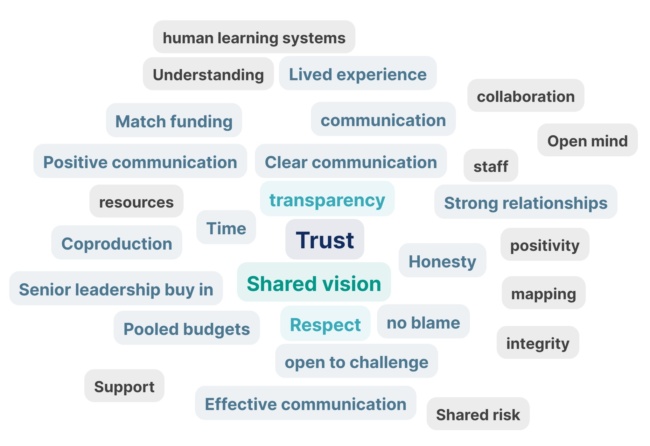Key enablers and principles for strategic and collaborative commissioning and planning - health and care
It has been hypothesised for a number of years that, in order to meet the holistic needs of individuals who require health and care support, effective collaboration between those responsible for health services, social care services, public health and wider public services is required. In addition, this should be done with close and meaningful partnerships with providers of care, community organisations and with local people and communities.
Integrated care systems (ICSs) are partnerships that combine NHS organisations, local authorities and others to take collective responsibility for planning services, improving health and reducing inequalities across geographical areas. As legal bodies with statutory powers and responsibilities for planning and commissioning, ICSs were implemented in 2022, following the Health and Care Act being passed at UK parliament.
The introduction of statutory Integrated Care Boards and the legacy of joined up working through the Better Care Fund, and most recently over the high impact years of the Covid-19 pandemic, has shifted the scale and pace of collaboration across many systems.
On 14 March 2023, Amy Harmsworth and Amy Simpson (IPC) hosted an online webinar considering the key enablers and principles to support effective collaborative commissioning and planning across health and care. IPC were joined by guest speakers Sarah Femling (Programme Director for System Development, Nottingham and Nottinghamshire Integrated Care Board) and Bobby Lowen (Programme Director, Changing Futures Nottingham) who shared their experiences of a ‘Learning Labs’ approach to supporting effective relationships and commissioning arrangements across health and care in their local system.
A flavour of some of the insights from participants at the webinar:
Current barriers or challenges for Collaboration between health and social care:
Balancing this work with acute demands means partners are in 'fire fighting' mode
Lack of senior commitment to ensure people have carved out time/space to do this work/overall capacity to undertake strategic work
Prevention seems to be moving down the agenda. This is partly due to the conditions of funding/resources awarded i.e. short term arrangements
Relationships i.e. maturity of social care/health relationships, as well as those between commissioners and providers
Equity of partnership - can feel NHS dominated
Lack of clarity in organisational roles
Governance arrangements - unclear, causing unnecessary and frustrating delays.
Enablers to support effective collaboration between health and social care:
Importance of relationships - trust, openness and honesty
Good provider engagement and co-production approaches
Getting the right people around the table and good leadership
Obtaining high level buy-in from influential leaders
Listening to people with lived experience, particularly where this highlights the damage caused by siloed working (in terms of their experiences and outcomes) and/or how collaboration between services has had the opposite effect
Joint funding/pooling of resources/joint posts
Understanding 'the golden thread' i.e. what is in it for everyone? What are the benefits for different partners, what does the evidence tell us about the impact of collaborative approaches?
Understanding different partners core priorities, challenges and responsibilities and looking for (and being realistic about) opportunities for alignment
It is okay to start small and make small operational changes. This is a good starting point which can facilitate wider conversations and help build relationships
Flexibility and collaborative working during the pandemic has helped to improve relationships between commissioning organisations and providers
Shared understanding of language and terminology e.g. what is meant by prevention across organisations
Sharing best practice with others e.g. in forums like the webinar.
What key enablers or principles do your believe need to be in place to support effective collaborative / integrated commissioning?
Poll

Related News

Supporting the provider care market to go digital and use technology safely
24/06/2024
Read the feedback from our webinar targeting Adult and Social Care commissioners
Related Services

Training and Development
We are committed to the professional growth of our clients' teams. Through bespoke coaching, training, and development programmes, we empower staff and stakeholders with the essential skills and knowledge to deliver services.






